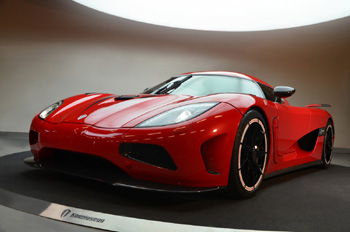Mar 1 2012
Driven by Robert Serwanski at the Angelholm airfield, Sweden, on 2 September 2011, the Agera R set some remarkable times, one of which broke the existing Guinness Book of World Records title for 'The fastest time for a two-seater production car to travel from 0-300-0 km/h', which it achieved in just 21.19 seconds! This attainment was later ratified on 27 November 2011.
 Photos courtesy and © Koenigsegg Automotive AB.
Photos courtesy and © Koenigsegg Automotive AB.
A powerful 1,115bhp engine, high-performance brakes, exceptional handling, driver experience, and the application of Umeco's lightweight prepregs for the structure, bodywork and cosmetic trim all contributed to the record-breaking performance of this impressive hypercar.
Koenigsegg has been using Umeco's lightweight prepregs to minimise overall vehicle weight for many years. Umeco's BPS240 body panel system is being used for the bodywork, MTM57 prepreg for internal and external cosmetic trim, and MTM58FRB prepreg for the chassis, under-bonnet parts and ancillary structural components. What you experience here on the Agera R is the amalgamation and application of lightweight products developed in partnership by Koenigsegg and Umeco.
The Agera R is the continuation of a long-standing, mutually-beneficial association, and the product of Koenigsegg's design and manufacturing expertise. It follows on from their equally successful supercars, the CCR and CCX models.
Umeco's BPS240 composite carbon fibre prepreg body panel system is being used for the sleek, stylish, sculptured body panels of the Agera R. BPS240 is Umeco's two-part, partially-impregnated epoxy prepreg system specifically designed for car body panels. BPS240 provides excellent surface quality from vacuum-only or press mould processing. The first ply, which utilises Umeco's ZPREG partial impregnation technology, consists of a structural fabric coupled to a surface scrim by a high performance resin system. The second ply combines a low density syntactic core material and a structural fabric to create significant panel rigidity in a rapid laminating format. The system is designed to be ready for painting without additional surface rework. In many cases, paint is applied directly to a degreased panel. Excellent environmental performance is achieved from panels painted in low-bake and hi-bake paint systems.
Koenigsegg uses Umeco's MTM57 to achieve the superior surface finish on the Agera R's interior and exterior cosmetic trim panels. MTM57 exhibits excellent toughness and can be processed using autoclave, vacuum-only and press mould processing. As is evident on the Agera R, the surface finish achievable with this prepreg is flawless.
To provide required handling characteristics, Koenigsegg is building the Agera R's chassis, under-bonnet parts and ancillary structural components from Umeco's MTM58FRB prepreg. This is a black pigmented, flame-retarded, 120°C curing epoxy prepreg matrix specifically developed for component manufacture. It is suitable for autoclave, vacuum-only and press moulding processing, and is self-extinguishing and flame-retarded, meeting the requirements of FMVS302/ISO3795 and FAR25.857.
Koenigsegg also uses Umeco's master model materials and LTM12 tooling prepregs for all main production parts on the Agera R. Fully compatible with Umeco's component prepregs, LTM12 is a low temperature cure prepreg which may be used to produce composite tooling direct from low temperature master models. Following a suitable, free-standing post-cure, LTM12 tooling can be used at temperatures up to 200°C.